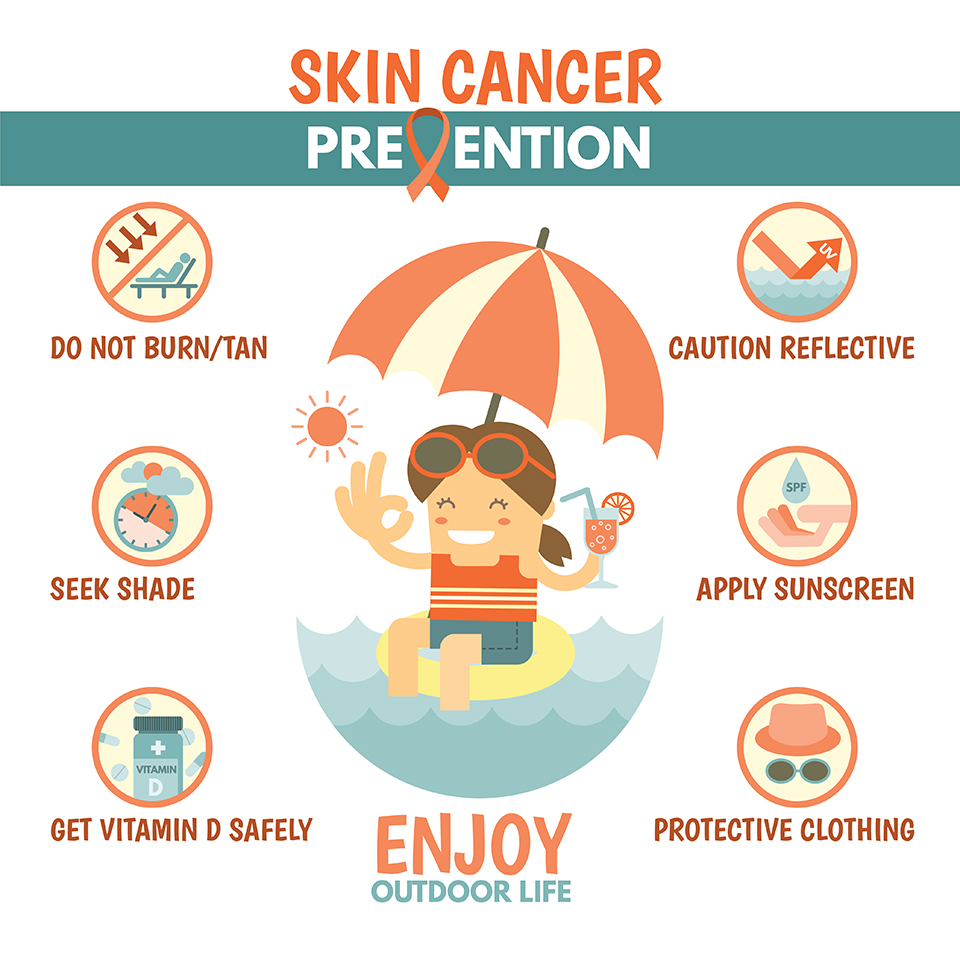Sun SafetyImportant Information You Should Know

How can you be mindful in the sun? Does the sun have benefits?
You may have been taught that you need sunlight for your body to make vitamin D, because vitamin D is not found naturally in most foods. But today, many foods are fortified with vitamin D during the manufacturing process. Thus, sun exposure is not as important for the body's vitamin D supply as it used to be. Of course, being outdoors makes most people feel good. And playing tennis is better for your health than watching television. But you can still protect yourself from the sun's damaging effects while enjoying yourself outdoors.
How can I avoid the harmful effects of the sun?
Staying out of the sun is the best way to avoid sun damage, but most of us go outdoors regularly. So when you go outside, take these precautions:
Always wear sunscreen. Apply it on your skin every day. Make it a habit, as you do with brushing your teeth.
Avoid sun in the middle of the day, from about 1 O am to 3 pm. The ultraviolet rays, which cause sunburn, are strongest during this time.
Wear protective clothing. When you do go outdoors, especially for long periods in the middle of the day. Long sleeves and slacks, as well as a wide-brimmed hat, help protect your body against the sun's harmful effects.
Wear sunglasses that filter UV light.
What is SPF In a sunscreen?
SPF stands for sun protection factor. The SPF number tells you how well the product will protect you from UVB, the burning rays of the sun. (Most sunscreens also absorb ultraviolet "A" rays, or UVA.) The higher the SPF number, the greater the amount of protection. Everyone should use a sunscreen with an SPF of at least 30. If you have had a skin cancer or precancer, you should use a sunscreen with an even higher SPF. Many of the new sunscreens have SPFs of 45 or higher.
I don't burn very often. Does this mean I can use a sunscreen with a low SPF?
If you were only trying to avoid sunburn, the answer would be "yes." But protection from sun bum is not the most important reason for wearing sunscreen. You want to reduce damage from the sun. Your skin can be harmed by constant sun exposure, whether or not you see a burn. Remember, sunburn is an immediate reaction, but damage from the sun occurs over a lifetime. If you have had a skin cancer or pre-cancer, you should use an SPF of 30 or higher.
Who should use sunscreens?
Anyone who spends time outdoors should use a sunscreen. This includes:
men, women, and children
people who tan easily and those who don't
fair-skinned and dark-skinned people; people who already have tans and
People who already have tans and sunbathers, gardeners, and skiers.
Are sunscreens safe for children?
Yes. Not only are sunscreens safe for children over age 6 months, if used regularly in childhood they can prevent skin cancers from developing in later life. Recently, a researcher reported that if sunscreens were used regularly by children through the age of 18, there would be a 72% reduction in the cases of skin cancer later in life.
How should sunscreens be applied?
Sunscreens are very effective when used properly. Follow these guidelines to give yourself the most protection:
Apply the sunscreen at least 20 to 30 minutes before you go outdoors, whenever you will be exposed for 30 minutes or more.
Reapply sunscreen every 2 hours while you are outdoors, even if the product is labeled "all-day." If you get wet or perspire heavily, reapply sunscreen more frequently.
Cover all exposed areas, including your ears, lips, face and back of your hands.
Don't skimp; apply a generous layer. Smooth it on rather than rub it in. A rule of thumb is that 45 ml (a shot glass) of sunscreen is needed to cover all exposed skin to attain the stated level of protection.
Women should apply sunscreens under makeup. If you wait to apply sunscreen until you hit the beach, you may already be perspiring, and moisture makes sunscreens less effective.
© Copyright 1995-2023 The Cleveland Clinic Foundation. All rights reserved.
This information is provided by the Cleveland Clinic and is not intended to replace the medical advice of your doctor or health care provider. Please consult your health care provider for advice about a specific medical condition. For additional health information, please contact the Center for Consumer Health Information at the Cleveland Clinic (216) 444-3771 ☎ or toll-free (800) 223-2273 ☎ extension 43771. If you prefer, you may visit Cleveland Clinic
Healthy Community Initiative (HCI):
#HealthyCommunitiesInitiative
The Healthy Community Initiative is a collaborative effort between Cleveland Clinic and community partners to promote optimal health and wellness. Based on the community health needs assessment and utilizing combined resources within our local communities, Healthy Community Initiative programs will be customized around three core areas: education, nutrition and physical activity.
Live Long Lyndhurst Health and Wellness Initiative (HWI):
#LiveLongLyndhurst
Live Long Lyndhurst is a Health and Wellness Initiative between the City of Lyndhurst, Cleveland Clinic Community Outreach, Legacy Village, Cleveland Metroparks at Acacia, The Fedeli Group, the YMCA, South Euclid - Lyndhurst Schools, Second Sole and Anthem BlueCross BlueShield.
